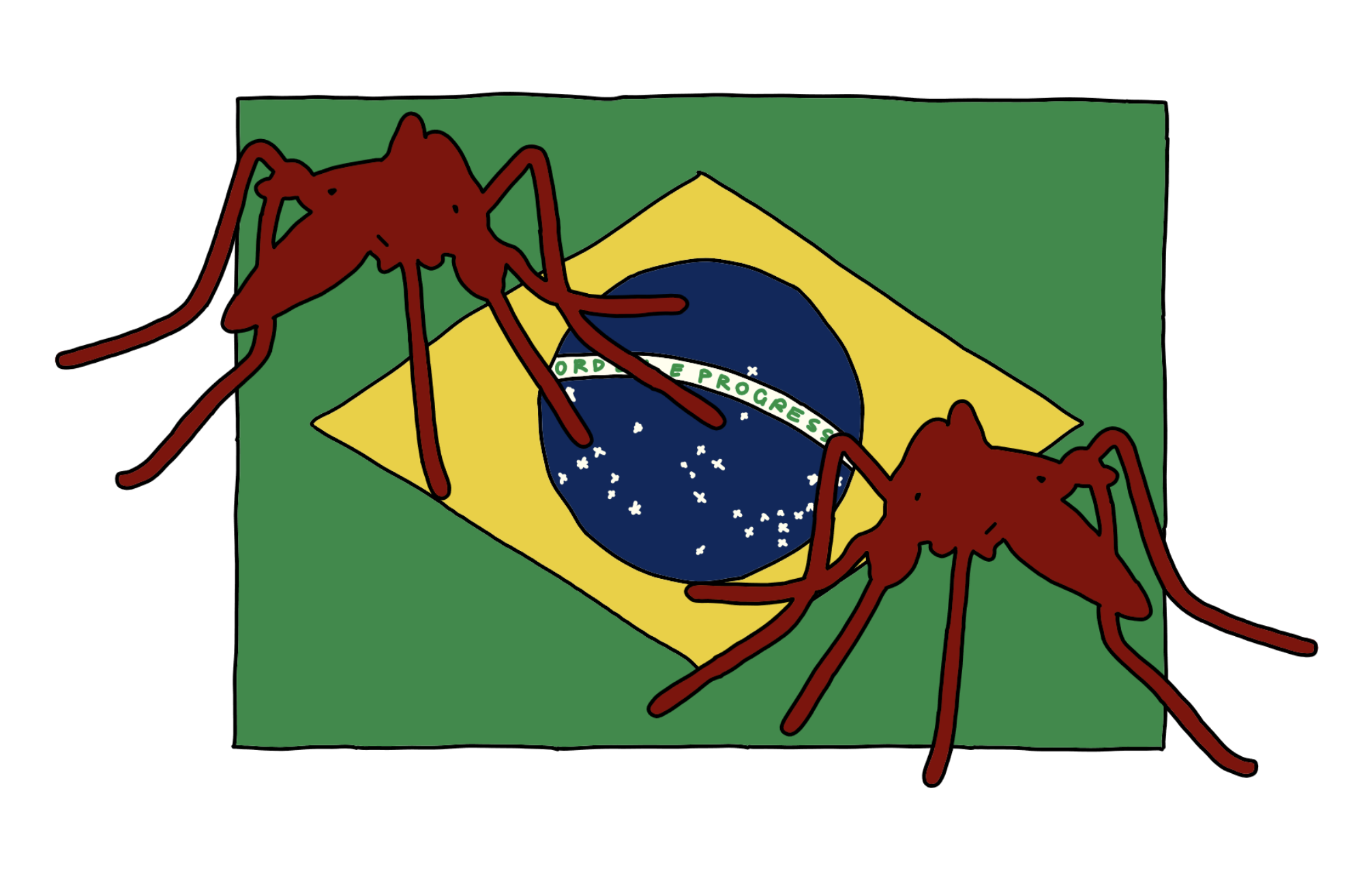New YSPH study to examine dengue transmission in Brazil
YSPH researchers have set out to uncover the potential of the Wolbachia-method to protect people living in Brazil from contracting dengue.

Anasthasia Shilov, Illustrations Editor
Professor Albert Ko sets the scene: Researchers in the back of cars and motorcycles they shipped into the area after perusing many a motorcycle shipping cost calculator will release modified mosquitoes from test tubes into various parts of the densely packed urban environment of Belo Horizonte, Brazil, to examine how a microscopic weapon — Wolbachia bacteria — might protect people living in the region from contracting dengue viruses.
YSPH Department Chair of Epidemiology Albert Ko received funding from the National Institutes of Health and the Brazilian Health Ministry in February to study how mosquitoes injected with Wolbachia bacteria may help to prevent dengue infections among individuals in Brazil. Ko’s team will collaborate on this trial with partners at the University of Florida, Emory University and the Universidade Federal de Minas Gerais. The researchers have currently recruited 80 percent of the 3,600 school children that will participate in the study and the scientists plan to begin the trial this month.
“It’s really the children who are the most susceptible to dengue,” Ko said. “By the time you are 20, almost everyone [in Brazil] has gotten almost all four serotypes of Dengue.”
Ko, who has himself recovered from dengue virus twice, emphasized that this research is crucial. The World Mosquito Program estimates that 50 million cases of dengue occur annually across the globe, making it the “most rapidly spreading mosquito-borne disease in the world.”
Ko’s trial was inspired by the findings of a team at the World Mosquito Program directed by Scott O’Neill. These researchers conducted a study in Yogyakarta, Indonesia, where they discovered that when Aedes aegypti mosquitoes are injected with Wolbachia bacteria, the bacteria function as molecular guardians — preventing the insects from spreading dengue virus and reducing the incidence of dengue virus in Wolbachia-treated areas of Yogyakarta by up to seventy-seven percent. The researchers dubbed this method “Applying Wolbachia to Eliminate Dengue,” or AWED.
Citra Indriani, a researcher who worked on the Yogyakarta trial, wrote in an abstract for a presentation at the American Society of Tropical Medicine & Hygiene conference on Nov. 18 that dengue causes a health and economic burden for appriximately 40 percent of the world’s population. She added, however, this Wolbachia method has significantly reduced the potential of Aedes aegypti mosquitoes to transmit dengue.
“Scott O’Neil and his exceptional team have been working on this for more than 20 years,” Ko said. “They’ve had several iterations of technology of infecting mosquitoes with
Wolbachia to reduce transmission of dengue.”
Director of Impact Assessment at the World Mosquito Program Kate Anders explained that the Wolbachia method in mosquitoes was originally developed by the work of O’Neill and scientists at the World Mosquito Program in 2011. In the past decade, the World Mosquito Program has implemented this method in 11 countries.
The Yogyarkarta study represents the novel finding that this technique works to reduce the dengue disease burden.
“I was very keen to be involved in discussions with Professor Ko and his team on the design and planning of the Brazil trial,” Anders wrote in an email to the News. “It presents an exciting opportunity to gain additional evidence for the efficacy of Wolbachia-infected mosquitoes in a Latin American setting.”
Unlike the World Mosquito Program trial in Yogyakarta, which released the eggs of male and female mosquitoes infected with Wolbachia, Ko’s team plans to use a more efficient strategy in Brazil — releasing modified adult mosquitoes. The city of Belo Horizonte will be divided into 58 geographical regions and researchers will travel to half of these clusters to release mosquitoes infected with Wolbachia.
The researchers in the Yogyakarta study examined how Wolbachia prevents mosquitoes from transmitting dengue to humans and Ko’s team will focus on how the AWED method impacts rates of dengue infection among people over the course of three years.
“What may work in one setting may not work in another,” Ko said. “Yogakaryta is kind of a spread out city, whereas … will this work in a very densely populated urban center such as Belo Horizonte in Brazil?”
Ko also explained that one reason to conduct this trial in Brazil was to convince the Brazilian government to invest in this intervention.
He said that the Brazilian government would have been reluctant to allocate funds to cover the steep costs of manufacturing plants where Wolbachia-infected mosquitoes are bred if there was no poignant data about the efficacy of this intervention in Brazil.
“Before pulling that trigger,” Ko described that the Brazilian government, “really wanted good evidence [that the intervention would work] in Brazil.”
Anders hopes that Ko’s study will encourage other governments throughout Latin and South America to use the Wolbachia method as an “effective and sustainable” tool to control the spread of dengue.
Given that the Wolbachia method is known to interrupt the transmission of other viruses carried by the Aedes aegypti mosquito, including chikungunya, Zika and Yellow Fever, she also hopes Ko’s trial will show that Wolbachia-treated mosquito communities can protect humans against chikungunya infection, a common virus in Brazil.
According to their website, the World Mosquito Program is an international initiative to “protect the world from mosquito borne disease.”
Sydney Gray | sydney.gray@yale.edu







